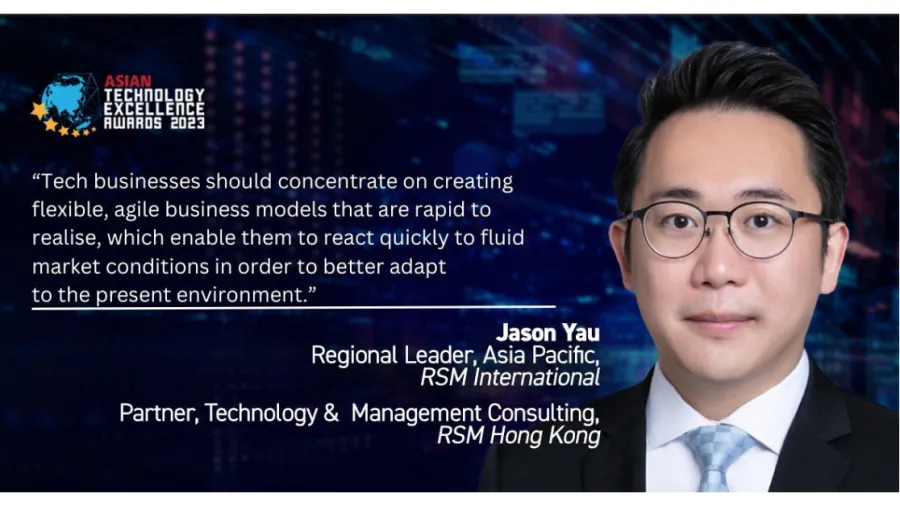
Assisting digital economy development offers growth prospects for tech companies: RSM leader
Yau said the digital economies of Asia Pacific’s developing nations are essential for their competitiveness in the modern world.
Jason Yau is the current Asia Pacific Regional Leader of RSM International and the Head of Technology of RSM Hong Kong. Having over 18 years of auditing and consulting experience, he works closely with RSM member firms in implementing global strategy within the region, including brand, client service, marketing, business development, training, service offerings, and succession planning.
Yau has been with the company since 2004, where he was originally based in its New York office, providing audit and consulting services to financial institutions and asset management companies.
Other than the regional role, he currently leads the company’s Technology and Management Consulting division in providing IT assurance, security and privacy, and digital transformation services for regional and global clients.
Looking into the Asia Pacific region’s digital economies, Yau noted that by making investments in digital infrastructure, granting cheap access to technology and digital services, and developing upskilling programmes for local talent, tech businesses can help propel local economies.
“Tech businesses should concentrate on creating flexible, agile business models that are rapid to realise, which enable them to react quickly to fluid market conditions in order to better adapt to the present environment,” he said.
As one of the judges for this year’s Asian Technology Excellence Awards, the RSM leader shared insights on the importance of strong digital infrastructures in long-term recovery, trending technologies and the opportunities they present for the tech industry, as well as the reported layoffs of tech giants earlier this year.
Amidst reports of massive layoffs from tech giants this year, how do you think other tech companies can avoid this occurrence? What areas do they need to improve on or strengthen?
In the past few years, tech companies seem to have over-hired, leading to this round of massive layoffs. As with any technology practice, there are many cash-burning exercises that support forward-looking projects, and it is crucial for management to monitor project margins, utilisation and return on investments. At times, a “stop-loss” decision must be made to enable a healthier future. Areas tech companies can consider improving on include:
- Reevaluating the loss-making business unit and if the unit has any strategic importance to the company’s future.
- Diversifying revenue streams, spending on R&D to develop new goods and services, and growing their client base to prevent significant layoffs in the tech sector.
- Emphasising employee retention as a top priority by offering chances for retraining and upskilling, developing a happy workplace environment, and providing competitive pay and benefits.
- Concentrating on creating business models that are more effective, enhancing teamwork and communication, and embracing cutting-edge technologies to boost efficiency and effectiveness.
- Improving accountability and margin by implementing IT management tools to standardise and automate processes.
With the metaverse making noise in the tech industry, what do you think are some opportunities and benefits to utilising this space? How will it drive growth for tech companies and the industry?
Metaverse has created a lot of new opportunities for tech firms which were not imaginable in the past. Some of the benefits include enhanced immersive customer experiences, enabling virtual trade and commerce, new forms of cross-border and cross-platform interaction and collaboration, and performing high-risk research and development exercises.
Businesses can further increase their worldwide audience reach and promote more immersive interactions. As such, there will be newer forms of revenue streams by utilising the metaverse. The metaverse also has the potential to spur innovation and teamwork across a range of sectors, including gaming, entertainment, education, and healthcare.
What do you think is the importance of developing countries’ digital economies in today’s context? How can tech companies contribute to this undertaking?
From the APAC perspective, the digital economies of developing nations in this region are essential for their economic development and competitiveness in the modern world. By making investments in digital infrastructure, granting cheap access to technology and digital services, and developing upskilling programmes for local talent, tech businesses can in turn help propel local economies. Developing nations should attract companies that encourage innovation and entrepreneurship by giving them access to markets, and money in the form of subsidies, infrastructure support, and mentorship. Tech companies can offer new prospects for growth and increase their consumer base by assisting the development of digital economies in developing nations.
As digitalisation is still expected to be a key factor in recovery or success in the long term, what can you advise tech companies to better adapt to the current landscape?
Tech businesses should concentrate on creating flexible, agile business models that are rapid to realise, which enable them to react quickly to fluid market conditions in order to better adapt to the present environment. This type of business model entails accepting the remote workforce, making investments in digital transformation projects, and implementing cutting-edge technology to increase productivity and efficiency. Additionally, businesses should prioritise data-driven decision-making and foster an environment that is open to experimentation and innovation. Tech businesses may better negotiate the difficulties of the present environment and put themselves in a position for long-term success by remaining agile and adaptive.
As part of the esteemed judges for this year’s Asian Technology Excellence Awards, what qualities are you looking for in this year’s winners?
I am very pleased to be part of the esteemed judges for the Asian Technology Excellence Awards. As a practitioner in the IT advisory space, I am looking for businesses that exhibit innovation, originality, quality and perseverance. Companies that are using technology to improve social and environmental impact, as well as those who are pushing the boundaries of what is practical in their respective sectors are winners to me. In addition, I would be vouching for those businesses that demonstrated a consistent track record of high customer satisfaction by solving real, urgent issues for the APAC region.


















 Advertise
Advertise







